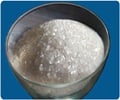Sugar-sweetened beverages may increase the risk of chronic health problems such as obesity, cardiovascular diseases and diabetes. Consuming a healthy diet can reduce the risk of chronic health problems.

TOP INSIGHT
Eating a healthy diet including minimally processed whole grains, fruit, vegetables, and healthy fats can improve health and reduce the risk of chronic health problems.
The paper's sugar-sweetened beverage consensus is particularly relevant in light of a recent legal battle over warning labels on soda, which hinged on the 9th Circuit Court's determination of whether soda and other sweetened beverages are uniquely harmful to human health or one source of calories among many.
"What's new is that this is an impressive group of scientists with vast experience in nutrition and metabolism agreeing with the conclusion that sugar-sweetened beverages increase cardiometabolic risk factors compared to equal amounts of starch," said lead author Kimber Stanhope, a research nutritional biologist with the School of Veterinary Medicine at the University of California, Davis.
SUGAR SUBSTITUTE WON'T MAKE YOU FAT
Another interesting point of consensus among researchers is the role of the sugar substitute aspartame. The authors agreed that aspartame does not promote weight gain in adults. Stanhope said this might come as a surprise to most people.
The authors also agreed that consumption of polyunsaturated (n-6) fats, such as those found in some vegetable oils, seeds and nuts, lowers disease risk when compared with equal amounts of saturated fats. However, that conclusion comes with a caveat. Dairy foods such as cheese and yogurts, which can be high in saturated fats, have been associated with reduced cardiometabolic risk.
"We have a long way to go to get precise answers on a lot of different nutrition issues," said Stanhope. "Nevertheless, we all agree that a healthy diet pattern consisting of minimally processed whole grains, fruit, vegetables, and healthy fats promotes health compared with the refined and palatable typical Western diet pattern."
Source-Eurekalert
 MEDINDIA
MEDINDIA




 Email
Email










